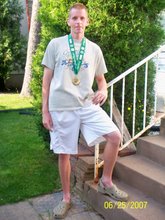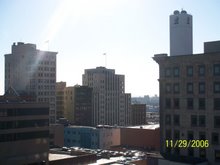-
-
-
Gay men and women embrace Internet as an equalizer and a bridge
Bruce Vilanch is old enough to remember how gay men used to meet each other. This was back in the day before the Internet changed everything.
“In the gay community, what’s profoundly different is when I was coming along, the first point of communication for people was a bar.” Now, he said, “most people’s first contact with each other is online.”
“It’s made a shift in a way the community behaves,” said Vilanch, a top-shelf Hollywood comedy writer, star of the Broadway show “Hairspray” and author of “Bruce! Adventures in the Skin Trade & Other Essays.” “It’s no longer centered on bars or anonymous encounters. They can all be done online. They don’t have to be done in alleys.”
Today, “you don’t have to feel furtive,” he said. Then he noted a dichotomy: “But there are lots of people who get off on being furtive.”
Staring down fear and isolation
The rise of the Internet in the last decade and a half has meant major changes in how just about everybody goes about his or her day. But this is especially so for the estimated 15 million to 17 million gay Americans.
“The Internet is the greatest thing that has happened to gay people since the Stonewall riots,” the 1969 confrontations in New York that were a turning point in gay political expression, said Michael Alvear, a syndicated sex columnist and author of “Men Are Pigs But We Love Bacon.”
“Nothing has increased individual self-acceptance, nothing has promoted more straight understanding and nothing has diminished the fear and isolation that gay people feel more than the Internet,” said Alvear, who is from Atlanta and is co-host of the British TV series “The Sex Inspectors,” which also airs on HBO.
Kathy Belge, moderator of the Lesbian Life section on About.com, went so far as to say the Internet had probably saved lives because “it’s broken the isolation for gay men and lesbians and, I think, especially for gay and lesbian youth.”
“Let’s say there’s a little gay teenager in a suburb of Seattle, Washington. Previous to the Internet, if there was no one else in his school or in that neighborhood, that kid could just think they were the only one,” Belge said. “And now they can go online and they can find chat rooms for gay teens, all kinds of information about coming out, resources to figure out if they are or are not gay.”
Belge said she had recently gotten an e-mail message from a 16-year-old girl in Australia. Fifteen years ago, she said, the girl would have had no one to turn to, but “now she has somebody that she can write to and say, you know: ‘What can I do? Here’s my situation; can you help?’”
Many prominent gay thinkers and writers echo those testimonials. Besides making it easier for gay people to reach out to each other one to one, they said, the Internet also gave them a way to coalesce as a community.
“Politically, I think it’s helped us to organize around certain issues, become informed,” Belge said, because national organizations can “get involved right away when there’s an issue going on that’s important.”
Alvear added that through sites like Family Acceptance, which helps gay people heal fractures with their families, the Internet “has not only changed gay people, but it has changed straight people.”
The flip side
Still, it is easy to give the Internet too much credit. American attitudes toward homosexuality have been liberalizing since the 1970s, long before the Internet arrived; that shift has been accelerated by the Net, but it’s inappropriate to conclude that the Net had a primary role in it.
“Things began to change [with] the civil rights movement and the feminist movement and then the gay rights movement,” said Katherine V. Forrest, a pioneering lesbian author who writes best-selling novels starring Kate Delafield, a lesbian police detective. The Net is a “facet” of that, she said, but “I think a number of things brought us together as a community.”
“Oddly enough, one thing that happened that we thought would absolutely destroy us was AIDS, but what that ended up doing was it absolutely united us as a community,” she said. “It brought many lesbians into the lives of gay men because we were there as nurturers, sometimes as nurses, as good friends, as supporters and as part of their activism because of the revulsion against that illness.”
And for all the help the Net has been, it has also brought about changes that not everyone is happy with. Take Vilanch’s observation about how gay people make contact.
Richard J. Schneider, writing last month in The Gay & Lesbian Review Worldwide, ticked off a range of touchstones of gay life in America that look endangered by the Internet: “Small bookstores have been closing one by one, a casualty of Amazon.com; gathering places such as bars and clubs have been disappearing in many U.S. cities; local papers are struggling because they’re not getting the personal ads that once sustained them.”
More troubling, Belge said, is that the universality of the Internet has made the gay community easier to reach for those who would prey on it.
“It opens up especially gay youth for more victimization and potential exploitation,” she said. “We all hear the stories — right? — of someone meeting someone on the Internet and getting taken advantage of.”
What’s to come?
In the long run, the impact of the Internet will be measured as much by how it allows gay men and women to talk to one another as universally it allows them to talk to the outside world, because the gay community has its own divisions along lines of geography and socioeconomic status.
“If you talk to somebody in Chelsea or in West Hollywood, they’re going to say, no, [the Internet] hasn’t changed anything. But that’s not who it really changed,” said Alvear, the sex author. “The people who were out and proud ... that’s not who the Internet changed. The Internet changed everyone else.”
“I think that the Internet is actually a great equalizer,” said Damian McNicholl, an author in Pennsylvania whose novel, “A Son Called Gabriel,” was a finalist last year for a Lambda award.
“I believe that through education and through the portrayal of gay and lesbian people on the Internet ... that they live in suburbs, they write, they’re doctors, they’re lawyers ... I think that gradually it’s going to lead to total equality,” he said.
That day hasn’t come, Forrest said, but “today things are ever so much better.”
-
-
-
-
| Your Candy Heart Says "Get Real" |
-
I figured it would be a little project today to get a shot of our big "mall", the Miller Hill Mall, which is the largest shopping complex for about 165 miles, until you get to the Twin Cities. People from all over the area come to the mall, from northern Minnesota, Wisconsin, and upper Michigan. And many folks come from Ontario as well to shop here on the weekends. The mall is on busy Highway 53, which is going through it's own growing pains and traffic problems, basically what is happening is downtown is coming to the mall. There's a lot of businesses here, mostly big box ones, but no real plan was set up to make this accessible. If you don't have a car, navigating your way around the mall area sucks. It was originally built in 1972, and since then, the Miller Hill area, which is on the northern end of Duluth (about 5 miles outside of downtown) is basically swamp. The roads are cracked, and what it desperately needs are some frontage roads. I don't really care to hang out at the mall. It gives me bad memories of walking around there in high school by myself while the 'cool kids' would run around in packs. The mall is a family place, and downtown is more of a place to walk around alone and take in all the sights. You can sit down someplace and just sit; whereas at the mall it's as if you have to be armed with 'looking busy' material. I hate that. However, there are times when a trip to the mall just has to happen...I love to read, and Barnes and Noble gets some great material to browse. Sometimes I head for the mall just for BN. Otherwise, I prefer to stick to the grit of downtown...I don't know, there's something about the history of the downtown and the stories that go along with it, the people you see; maybe subconsciously since I've always felt so different I feel as if I fit in downtown better. Anyways, it's always fun to include a shot of another part of the city...it's hard taking a photo of the mall here because it's all on one level and a very long structure.
-
-
-
-
-
I took this photo of the SMDC Fitness and Athletic Center today (the gym). The lake is in the background, and you can see that when the temperature drops this low, Lake Superior literally starts steaming because the water temperature is warmer than the air temperature. Needless to say, I'm not goin' anywhere tonight. It might get even colder yet!
-
-
-
-
-
-
-
-



No comments:
Post a Comment